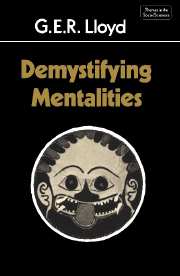Book contents
- Frontmatter
- Contents
- Note on texts and references
- Acknowledgements
- Introduction
- 1 Mentalities, metaphors and the foundations of science
- 2 Magic and science, ancient and modern
- 3 The conception and practice of proof
- 4 A test case: China and Greece, comparisons and contrasts
- Conclusion: mentalities demystified
- Notes
- Bibliography
- Index
4 - A test case: China and Greece, comparisons and contrasts
Published online by Cambridge University Press: 07 January 2010
- Frontmatter
- Contents
- Note on texts and references
- Acknowledgements
- Introduction
- 1 Mentalities, metaphors and the foundations of science
- 2 Magic and science, ancient and modern
- 3 The conception and practice of proof
- 4 A test case: China and Greece, comparisons and contrasts
- Conclusion: mentalities demystified
- Notes
- Bibliography
- Index
Summary
Thus far this study has attempted an analysis of some of the phenomena associated with the idea of divergent mentalities, and the thrust of my argument has been to suggest that much of the talk of mentalities does nothing to advance and may in certain respects positively impede understanding. Such talk often merely identifies what has to be explained, but without itself providing any adequate explanation: and it may even point away from any hope of one by invoking unverifiable psychological states or processes. In relation to some of the problems that provided part of the original stimulus for the invocation of divergent mentalities, our first step should be to pay due attention to the contexts of communication and in particular to the availability or otherwise of explicit concepts of linguistic categories. The Greek experience is particularly suggestive since we can there study how some such concepts came to be made explicit and the role they played in the development and legitimation of new styles of theorising. In connection, notably, with the Greek contributions to the development of natural scientific inquiry, we have no need to postulate some revolution in mentality, for the key moves consisted, rather, in the development of such new styles of theorising, based on, among other things, a self-conscious use of explicit categories. To understand those developments in turn a variety of factors may be appealed to, but among them the distinctive social and political circumstances of the sixth to fourth centuries b.c. are, it may be argued, of primary importance.
- Type
- Chapter
- Information
- Demystifying Mentalities , pp. 105 - 134Publisher: Cambridge University PressPrint publication year: 1990

